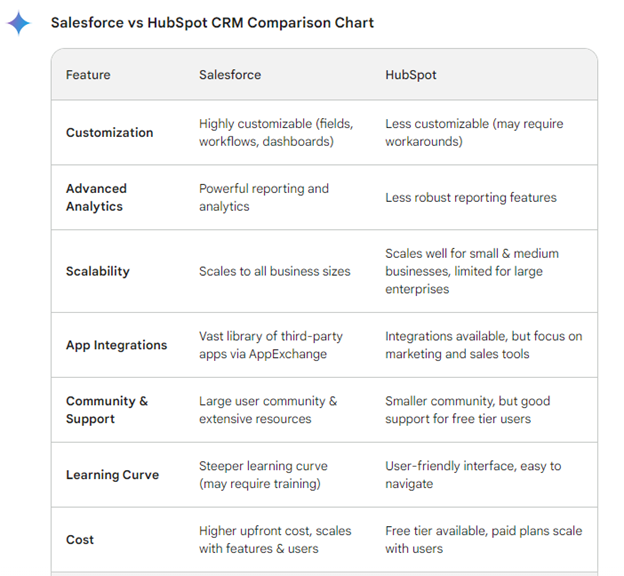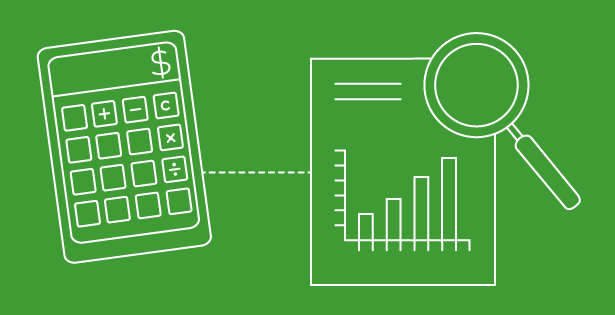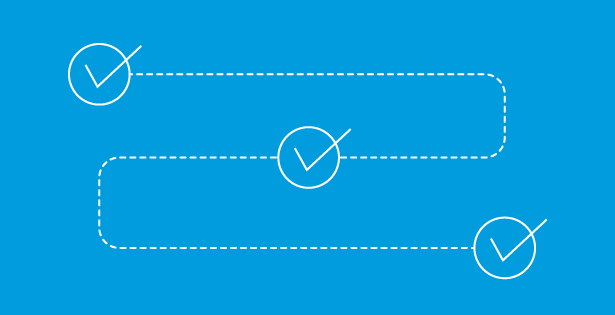In today’s competitive landscape, a strong Customer Relationship Management (CRM) system is crucial for businesses of all sizes. Two industry leaders, Salesforce and HubSpot, offer robust solutions, but selecting the right fit depends on your specific needs. This comparison dives into the pros and cons of each platform, helping you make an informed decision.
Salesforce
Pros
- Customization: Salesforce is a highly customizable platform. You create completely custom pages and automations due to Salesforce’s low-code programmatic capabilities. For example, a real estate agency can create custom objects for property details and automate tasks like sending follow-up emails after an open house.
- Advanced Analytics: Salesforce offers powerful reporting and analytics tools. You can gain deep insights into sales performance, identify trends, and forecast future success. Imagine a clothing retailer using Salesforce to analyze sales data any category, allowing them to analyze and optimize inventory management or track ongoing KPI’s using sophisticated reports and dashboards.
- Scalability: Salesforce caters to businesses of all sizes, from startups to large enterprises. Its scalable architecture allows you to add users, features, and integrations as your needs evolve. A small marketing agency can start with a basic Salesforce plan and easily upgrade to accommodate growing needs.
- AppExchange: The Salesforce AppExchange boasts a vast library of third-party applications that extend the platform’s functionality. You can integrate industry-specific solutions, productivity tools, and communication channels to create a unified business ecosystem. For example, a financial services company can leverage a DocuSign integration within Salesforce for seamless e-signature capabilities.
- Large Community: Salesforce benefits from a massive user community and extensive support resources. Online forums, user groups, and training materials provide valuable assistance for troubleshooting and maximizing platform utilization.
Cons
- Steeper Learning Curve: Salesforce’s extensive features can be overwhelming for new users. The initial setup and configuration require some technical expertise or investment in training resources.
- Higher Cost: Compared to HubSpot, Salesforce generally has a higher upfront cost. The pricing structure scales with features and users, making it potentially expensive for smaller businesses.
- Limited Free Tier: Salesforce offers a limited free trial, not a permanent free tier like HubSpot. This can hinder initial exploration for businesses with budget constraints.
HubSpot
Pros
- User-Friendly Interface: HubSpot boasts a clean and intuitive interface, making it easy for users with minimal technical experience to navigate and utilize the platform.
- Free Tier: HubSpot offers a free CRM tier with core contact management, deal tracking, and task automation features. This makes it an attractive option for startups and small businesses on a tight budget.
- Inbound Marketing Focus: HubSpot excels in inbound marketing automation. Features like email marketing, landing pages, and website forms streamline lead generation and nurture efforts. A B2B software company can leverage HubSpot to create targeted content campaigns and convert website visitors into qualified leads.
- All-in-One Platform: HubSpot integrates marketing, sales, and customer service tools within a single platform. This eliminates the need for multiple software solutions and simplifies data management.
- Scalable Pricing: HubSpot offers tiered pricing plans that scale with business growth. You can start with the free tier and upgrade to paid plans as you add users and require additional features.
Cons
- Limited Customization: While HubSpot offers some customization options, it’s not as extensive as Salesforce. Complex sales processes or specific industry needs might require workarounds or external integrations.
- Less Robust Reporting: HubSpot’s reporting features are not as advanced as Salesforce’s. Businesses requiring in-depth data analysis might find them insufficient for comprehensive sales insights.
- Limited Enterprise Scalability: While HubSpot scales well for small and medium businesses, its capabilities might be limited for very large enterprises with highly complex CRM requirement.

Salesforce shines for businesses needing a highly customizable, scalable CRM with advanced reporting and a vast app ecosystem. HubSpot excels for companies seeking a user-friendly, all-in-one platform with robust inbound marketing features and budget-friendly pricing options. Consider your specific needs, technical expertise, and budget to make the best CRM choice for your business.
RSM boasts a proven track record of success implementing Salesforce for companies of your size, leveraging expertise in both Salesforce and middle-market business needs. This combined knowledge ensures they don’t just implement Salesforce, but configure it to optimize your unique sales processes, maximize efficiency, and unlock the platform’s full potential to drive your business forward. For more information please visit RSM Salesforce consulting services.

 RSMUS.com
RSMUS.com



